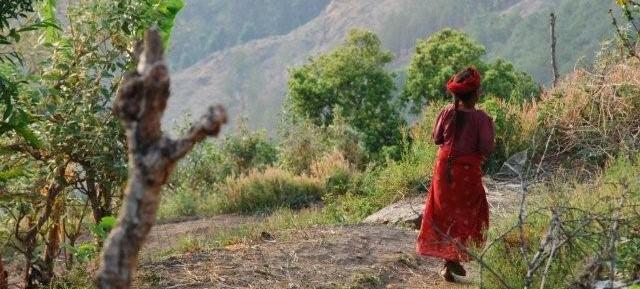During menstruation every woman wants to cuddle up in a warm blanket. However, women in certain rural areas in Nepal have to sleep in a cowshed during that period of the month.
Published on: 07/12/2016
In preparation of IRC's podcast WASH Talk (to be published in 2017) I got in touch with Radha Paudel - activist and director of Action Works Nepal. Paudel is a speaker in the podcast episode 'Menstrual Health'. I was very impressed by her work on social equality, gender based violence and menstrual health. Clearly I was not the only one who was impressed. The United Nations rewarded Paudel's excellent work on improving the rights for Nepalese women with a Peace Prize.
Paudel's determination to improve menstrual health around the world became clear to me when she set her alarm at 3 AM local time to take my call for the WASH Talk recording from the studio in the Netherlands.
Paudel also brought the so-called chhaupadi tradition to my attention - which is followed in certain rural areas in Nepal. Chhaupadi literally means 'untouchable being'. According to this tradition women are impure during their menstrual cycle. For a period of 1-5 days women are not allowed to be in their house. Therefore, menstruating women need to exchange their bed for the cold stone floor of the cowshed. This is also the case during labour. The bleeding directly after giving birth is seen as impure as well. Because of this, many Nepalese women bring their child into the world in a cowshed.
In 2005 the chhaupadi tradition was officially banned. But even nowadays still 25% of the Nepalese population follows this tradition, which forms a huge social issue.

The stay in the cowshed causes many problems. During the winter women are fighting against the cold weather of -30 degrees and during the summer they struggle with insects that cause diarrhoea and other diseases.
The women only have access to one set of clothes during those days and are covered in dirt from the shed. This all while hygiene is very important during menstruation to prevent diseases and infections. To freshen up the women have to go to the river since they are not allowed to use the sanitation facilities at home.
Meanwhile the daily work for the women continues – anything but working inside the house. Imagine doing that after a broken night due to the cold, sticky heat or getting kicked by animals.
Besides all this discomfort, the women also fall victim to (sexual) harassment of drunken men. The women in the shed are an easy target since they are in an unprotected place located some distance from their family at home.
"Menstruation is something natural. If you are not menstruating you cannot get pregnant. And without children there is no progression."
– Radha Paudel (activist and director of Action Works Nepal)
Menstrual health is a very sensitive topic all over the world – whether there is a taboo around it or not. Due to traditions such as chhaupadi, some girls keep their menstruation a secret so they can continue going to school and sleep in their own bed. Because of this, the chance of openly talking about menstruation becomes smaller and smaller. This may lead to unhygienic practices and incorrect assumptions concerning menstrual health.
The videos of The Guardian and Spuiten&Slikken [partly Dutch – 15.45-29.00min.] bring the viewer to areas in Nepal where the chhaupadi tradition is still followed. Both men and women from these communities share their view on this tradition. The fragment of Spuiten&Slikken also shows Paudel in action.
Luckily Paudel is not the only one battling to accelerate change in hygiene behaviour in Nepal. Hygiene behavioural change communication (BCC) is one of the pillars of IRC and SNV's Sustainable Sanitation & Hygiene for All (SSH4A) programme in Nepal, Bhutan, and Cambodia.
At IRC we have strong opinions and we value honest and frank discussion, so you won't be surprised to hear that not all the opinions on this site represent our official policy.